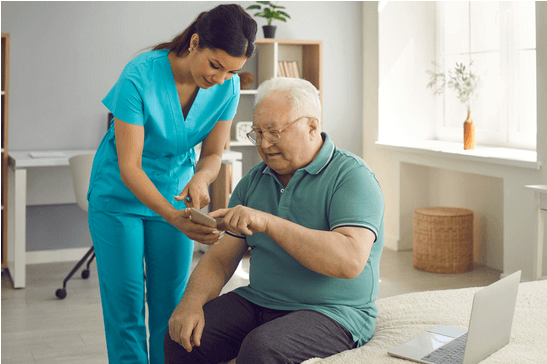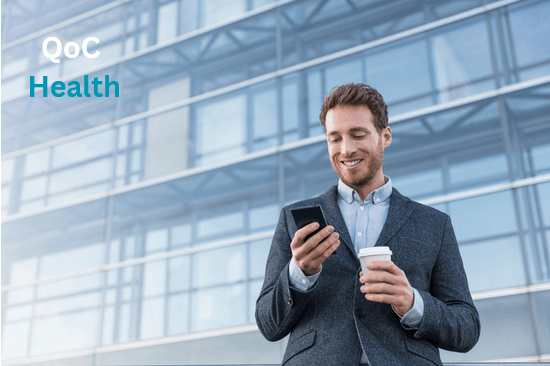In today’s world, smartphone applications or apps have become an integral part of our lives. Whether it’s staying connected with friends and family, playing games, or getting information on health and wellness, there is an app for practically everything.
As digital technologies advance rapidly, more and more healthcare providers also leverage apps to engage with patients, facilitate care delivery, and empower patients to take control of their health.
However, while mobile apps provide unprecedented access to health information and services, their widespread use also introduces new challenges from both medical and behavioral standpoints. So, it’s safe to say the effect of smartphone apps on patients has both positive and negative effects. Let’s have an in-depth look at these effects.
The Positive Effects of Smartphone Apps On Patients
Smartphone applications have transformed healthcare delivery in the digital era by putting powerful tools for health directly in patients’ hands. As mobile technologies have advanced, the rise of “Health” apps and devices has introduced many promising opportunities to make medical care more accessible, affordable, and empowering for individuals.
Here are the various ways smartphone apps have shown a positive impact on patient outcomes.

Increased Adherence To Treatment Plans
One of the major benefits of smartphone apps is their ability to help patients better follow the healthcare recommendations and medications prescribed by their doctors.
Many apps offer features like medication reminders, scheduling for regular check-ups and treatments, progress tracking, and gamification elements that make adherence to care plans more engaging and convenient. This level of support can be crucial for managing long-term conditions effectively.
Remote Monitoring And Management Of Chronic Conditions
For patients living with ongoing health issues like diabetes, asthma, heart disease, and more, smartphone apps provide a beneficial way to monitor health metrics remotely and share the data with caregivers.
Apps allow at-home readings of blood pressure, blood sugar levels, symptoms, etc. to be uploaded automatically, keeping healthcare providers updated in real time.
That facilitates early interventions when needed and helps providers better manage chronic conditions between office visits. It allows those with limited mobility increased access to care.
Around-the-clock access To Health Records And Services
Patients today expect instant access to their personal medical information as well as the ability to communicate easily with providers as needs arise.
Smartphone apps fulfill these needs through features like accessing test results, and immunization records, scheduling appointments, or emailing clinical questions directly to the care team.
This level of convenience supports self-advocacy and can allay health concerns promptly instead of waiting for the next in-office appointment.
Related: Can Mobile App Reduce Follow up Visits?
Opportunities For Just-In-Time Education
Whether searching health topics online, participating in app-based classes, or chatting with peers, patients consult their smartphones frequently for information and advice.
Apps deliver targeted, bite-sized medical facts, diagnosis explanations, lifestyle coaching, and preventive care guidance throughout the user’s day as daily reminders or in response to specific inquiries.
That enables patients to understand their conditions better, risk factors, self-care skills, and when to involve their providers in ongoing care decisions.
Social Support Through Online Communities
A significant benefit of health apps is bringing people together to support each other. Connecting individuals with similar medical conditions can help address the social isolation some patients may experience.
Through online forums and groups, users find encouragement, exchange treatment experiences, and advice, and develop a shared understanding. Research shows such peer connections have mental health benefits too by combating feelings of loneliness.
Potential Cost Savings Through Preventative Care And Fewer Office Visits
By facilitating remote monitoring, health education, and virtual consultations, smartphone technology provides an opportunity to transition appropriate care delivery out of traditional clinical settings.
For conditions that can be adequately managed from a distance, app-based prevention and maintenance reduces the need for frequent in-person appointments, tests, and procedures, thereby lowering healthcare costs over time. Early disease detection and intervention through digital tools also minimize expensive emergencies.
Related: How Mobile Application Impacted Healthcare?
More Convenient Self-Monitoring Of Health Metrics
Apps make it effortless for patients to track important health data and biometrics easily wherever they are. Readings that once required specialized devices handled by providers can now occur frequently at home with just a smartphone – things like weight, blood pressure, blood sugar, symptoms, and more.
Spotting trends aids timely communication with clinicians and uncovers potential issues in their initial stages before they escalate. This level of self-monitoring has become an integral part of managing a healthy lifestyle.
Ability to Quickly Seek Healthcare Advice
For non-emergency situations, smartphone apps provide people access to virtual care that does not suffer delays in scheduling a traditional appointment. People use apps and associated web platforms round-the-clock for common conditions, checking personal risk, getting medication consultations, and more.
They serve as an effective first point of contact for addressing health queries promptly and directing when actual facility-based care becomes warranted.
Easy Access To Mental Health Support
A significant advantage of app-based therapy tools is how readily available they make resources for maintaining mental wellness. Applications integrate coping techniques, cognitive behavioral exercises, mood tracking, and even connect individuals to counselors through chat/call functions.
As mental health issues sadly remain highly treatable yet under-treated, apps help reduce associated stigma and barriers to care through convenient, discreet support that fits into everyday lives.
The Adverse Effects of Smartphone Apps On Patients
While mobile health technologies provide considerable benefits, it is also important to understand the potential downsides of excessive or misused smartphone applications. Here are some of the negative effects apps have been associated with so their risks can be properly mitigated going forward.
Reduced Face-to-Face Communication
Considerable research has demonstrated that increased use of mobile apps and devices for social interaction can negatively impact real-world interpersonal communication.
By replacing in-person contact with text, photo, and video-based exchanges, individuals may develop weaker communication skills for understanding nonverbal social cues.
This can undermine the ability to build meaningful connections and mentor relationships. The decrease in unstructured social engagement brought on by “phubbing” (snubbing others for one’s phone) may exacerbate isolation and loneliness.
Excessive Smartphone Usage
When mobile app and phone overuse progresses to addictive levels, it can induce persistent stress and changes in brain neuroplasticity.
Extensive usage has been linked to higher rates of depression, anxiety, and other mental illnesses marked by an imbalanced default mode network.[2] prolonged cognitive multitasking may degrade focus and memory due to the limited ability to filter distractions.
Some individuals experience compulsive checking despite personal consequences, demonstrating addictive traits like withdrawal and tolerance. Social media usage especially has shown dose-dependent correlations with poor self-evaluation.
Privacy Risks
Mobile health apps that store, transmit, or process personal patient data introduce potential vulnerabilities. Data breaches could expose individuals to identity theft, financial damage, or medical discrimination. Insecure storage on portable devices increases the likelihood of unauthorized access.
Lack of consent obtaining and transparency about how data will be used post-study leaves users open to unexpected disclosures or profits from their records. Strict privacy and security protocols require careful technical implementation as well as clear communication and control given to participants.
Physical Health Impact
Prolonged engagement in entertainment media displaces time for exercise, adequate sleep, and mindful eating – pillars of well-being. Chronic light exposure can disrupt natural circadian rhythms leading to daytime dysfunction.
Adopted postures from hunching over small screens may induce pains, strains, or eyestrain over the years. Though convenient, replacing face-to-face activities with sedentary app use enables avoidance of stress relief through social support and movement.
Psychological Well-Being
In the same way, choosing virtual over real-life experiences supplies a constant but ineffective means to manage emotions. Overreliance on apps as a coping mechanism prevents learning resilience. They may even provoke anxiety through social comparison.
Data indicates significant relationships between screen overload and poor sleep quality, stress levels, withdrawal, and depression. While convenient stress-relievers, mobile apps should not replace healthy lifestyle habits and social connections essential for mental wellness.
Conclusion
Smartphone apps have provided patients with greater access to health information and services, helping to improve medication adherence and manage chronic conditions.
However, overreliance on apps comes with risks such as reduced social interaction, excessive smartphone usage leading to mental health issues, and privacy concerns with personal data storage and usage. A balanced approach is important to harness the benefits of mobile health technologies while maintaining well-being.
- How To increasebrown fat: What To Take? - July 23, 2024
- Does Brown Fat Make You Lose Weight? Benefits And Impact - July 21, 2024
- Does Coffee Increase Brown Fat? - July 15, 2024
